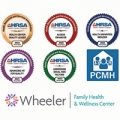You Are Not Alone: Help and Support Are Available

By
Sarah Becker, LCSW, Director, Children’s Outpatient and Community-based Services
Kathleen Daly, MA, Telephone Counselor
Let’s face it. We’re experiencing a difficult period, with increased isolation, health risks, job loss, and more. We are faced with increased responsibilities at home, a steady flow of alarming news coverage, and many related issues and disappointments, including significant changes our own lives and the lives of our children: distance learning; cancellation or postponement of proms, graduation ceremonies, yearbook signings, and other seasonal milestones.
While some of us have found ways to cope by reaching out to family members, enjoying our hobbies, exercising, and taking care of our health, others are struggling. Increasingly, people are turning to substance misuse and self-harm, including suicide.
If you or a loved one are in emotional crisis and are actively considering self-harm, here are some short-term strategies.
Reach out for help. The National Suicide Prevention Lifeline is a good place to start, 1-800-273-8255. The Lifeline provides 24/7, free and confidential support for people in distress and prevention and crisis resources for you or friends and family members. Your calls to this line will be directed to help and support in your area to best meet your needs. Counselors will assess your situation and your safety, and they will work with you on a plan for moving forward.
In Connecticut, the Department of Children and Families’ Talk It Out hotline helps parents and caregivers who need help managing the stress and increased needs resulting from caring for their children during the COVID-19 crisis. The hotline provides support from a network of trained professionals, including staff from Wheeler, who will listen and speak with people about their concerns, and if additional help is needed, make referrals to responsive programs, including Mobile Crisis Intervention Services. Call 1-833-258-5011 or visit www.talkitoutct.com. The hotline, which has English and Spanish capacity, is available Monday through Friday from 8 am to 8 pm and on weekends from 1 pm to 8 pm.
Mobile Crisis Intervention Services (formerly EMPS) offers an immediate response to children and youth, ages 3 - 17, or 18 if still enrolled in school, experiencing behavioral health emergencies in the home, school and other community or hospital settings. This response helps to maintain youth safely in the community and often eliminates unnecessary emergency department visits or subsequent inpatient admissions. In Connecticut, dial “2-1-1” and Press “1.”
Adult Mobile Crisis Intervention Services also are offered and available by calling “2-1-1”and pressing “2.”
Minimize exposure to news and social media. The consumption of a daily diet of startling news stories can leave you and your loved ones feeling more anxious and hopeless. Try and refrain from watching the news, or limit your exposure. Instead, divert your attention to a hobby, or set a goal for yourself and then pursue it.
Establish or reinvigorate connections with friends, colleagues, coaches, and religious leaders who are part of your world. Sometimes, the experience of social connectedness can be helpful, even if it’s through telephone or video chat.
Take care of yourself. Exercise regularly. Eat well. Take a drive. Stay in touch with friends and family. Get the proper amount of sleep. Engage in activities you enjoy or anything to makes you feel relaxed. Set limits for yourself and others, even if it means being alone with your thoughts or doing what you enjoy.
Break it down. Many times a situation, project, or task appears to be enormous and impossible to conquer. Concentrate on a particular task or issue. Write it down, and tackle one aspect. Then, repeat this process. This approach can help you to feel more in control.
Seek longer-term counseling and support. If you connect with support, your crisis professional will focus on your short-term safety and encourage you to seek follow-up therapeutic care. Wheeler offers services through telehealth and telemedicine. For information or to set up an appointment, call 888.793.3500.
Be gentle with yourself. Understand that as challenging as this time is, that everything is temporary. Give yourself credit for doing your best as you juggle being a full-time parent, teacher, and professional, or if you are struggling with loneliness and isolation, or wrestling with difficult family issues. Most of all, focus on your strengths. Remember the times you surmounted difficult obstacles. Remind yourself frequently that you will overcome this period, too.





